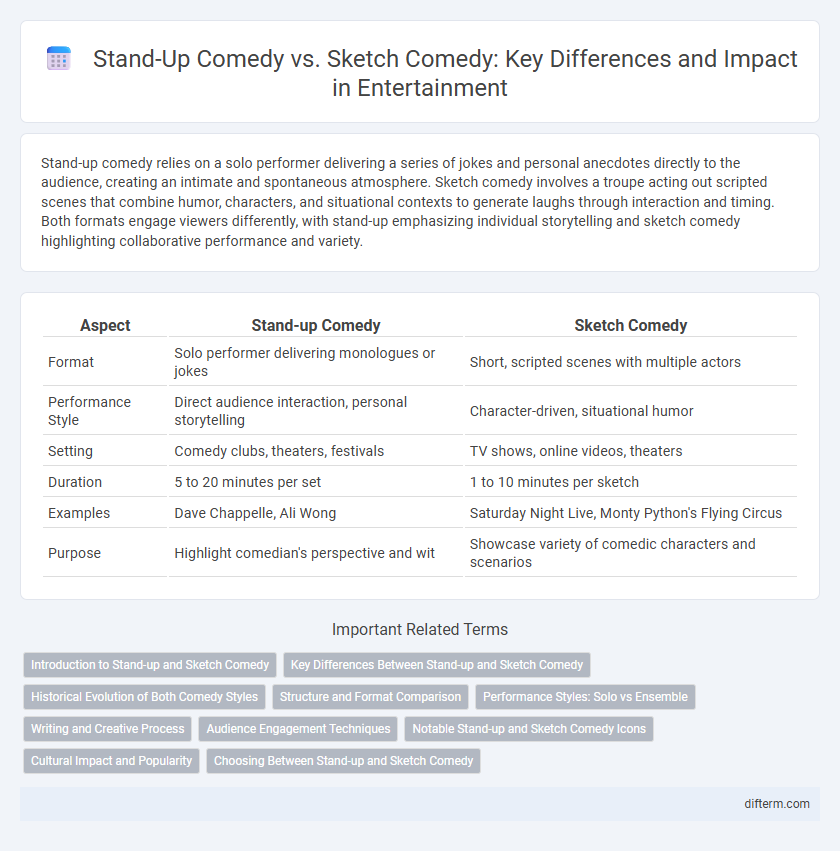Stand-up comedy relies on a solo performer delivering a series of jokes and personal anecdotes directly to the audience, creating an intimate and spontaneous atmosphere. Sketch comedy involves a troupe acting out scripted scenes that combine humor, characters, and situational contexts to generate laughs through interaction and timing. Both formats engage viewers differently, with stand-up emphasizing individual storytelling and sketch comedy highlighting collaborative performance and variety.
Table of Comparison
| Aspect | Stand-up Comedy | Sketch Comedy |
|---|---|---|
| Format | Solo performer delivering monologues or jokes | Short, scripted scenes with multiple actors |
| Performance Style | Direct audience interaction, personal storytelling | Character-driven, situational humor |
| Setting | Comedy clubs, theaters, festivals | TV shows, online videos, theaters |
| Duration | 5 to 20 minutes per set | 1 to 10 minutes per sketch |
| Examples | Dave Chappelle, Ali Wong | Saturday Night Live, Monty Python's Flying Circus |
| Purpose | Highlight comedian's perspective and wit | Showcase variety of comedic characters and scenarios |
Introduction to Stand-up and Sketch Comedy
Stand-up comedy features a solo performer delivering a series of jokes or humorous stories directly to the audience, emphasizing personal style and timing. Sketch comedy consists of short, scripted scenes performed by a group of actors, often highlighting exaggerated characters and situations. Both forms rely on timing and audience engagement but differ in format and presentation.
Key Differences Between Stand-up and Sketch Comedy
Stand-up comedy centers on a solo performer delivering a continuous monologue filled with jokes, observational humor, and personal anecdotes, relying heavily on timing and audience interaction. Sketch comedy features a group of actors performing scripted short scenes with multiple characters, often incorporating physical comedy, props, and situational humor to convey a storyline. The key differences lie in format, structure, and presentation style: stand-up emphasizes individual expression and direct engagement, while sketch comedy focuses on ensemble performance and narrative variety.
Historical Evolution of Both Comedy Styles
Stand-up comedy traces its origins to 19th-century minstrel shows and vaudeville performances, evolving into a solo act centered on personal storytelling and observational humor. Sketch comedy developed from early 20th-century theatrical revues and radio programs, characterized by scripted, short scenes performed by ensembles. Both styles have adapted over decades, with stand-up emphasizing individual voice and immediacy, while sketch comedy highlights collaborative writing and situational humor.
Structure and Format Comparison
Stand-up comedy features a solo performer delivering a continuous monologue of jokes and stories, emphasizing personal perspective and timing. Sketch comedy consists of short, scripted scenes performed by multiple actors, often involving character-driven humor and situational setups. The structure of stand-up prioritizes individual narrative flow, while sketch comedy relies on ensemble interaction and diverse scenarios.
Performance Styles: Solo vs Ensemble
Stand-up comedy centers on a solo performer engaging the audience with personal anecdotes, observational humor, and quick-witted improvisation, relying heavily on timing and direct interaction. In contrast, sketch comedy features an ensemble cast performing scripted scenes that combine character work, physical comedy, and situational humor, emphasizing teamwork and coordinated timing. The distinct performance styles influence audience dynamics, with stand-up fostering intimate connection and sketch comedy delivering varied narratives through collaborative execution.
Writing and Creative Process
Stand-up comedy relies heavily on personal storytelling and punchline-driven writing, requiring comedians to craft concise, relatable jokes that connect directly with live audiences. Sketch comedy involves collaborative writing teams developing scripted scenes with multiple characters, emphasizing situational humor and narrative structure. Both forms demand distinct creative processes: stand-up prioritizes individual voice and timing, while sketch comedy focuses on ensemble dynamics and visual storytelling.
Audience Engagement Techniques
Stand-up comedy relies on direct audience interaction through personalized storytelling, timing, and improvisation, creating a one-on-one connection that keeps viewers captivated. Sketch comedy employs scripted scenarios with multiple characters, using visual humor, scene changes, and ensemble dynamics to engage audiences with variety and surprise. Both formats leverage audience feedback, but stand-up emphasizes spontaneous rapport while sketch comedy focuses on rehearsed, collective performances.
Notable Stand-up and Sketch Comedy Icons
Stand-up comedy boasts iconic figures like Richard Pryor, George Carlin, and Dave Chappelle, whose solo performances highlight sharp wit and personal storytelling. Sketch comedy legends include Monty Python, Saturday Night Live cast members like Tina Fey and Amy Poehler, and Key & Peele, known for their character-driven, scripted scenes. These notable entertainers have significantly shaped their respective genres, influencing comedic styles worldwide.
Cultural Impact and Popularity
Stand-up comedy, characterized by solo performances and direct audience engagement, has significantly influenced global pop culture through iconic comedians who address social issues with humor. Sketch comedy, involving scripted group performances, often mirrors societal trends and political satire, shaping public discourse via television shows and digital platforms. Both forms maintain widespread popularity, with stand-up thriving in live venues and podcasts, while sketch comedy dominates online streaming and mainstream media, reflecting diverse audience preferences.
Choosing Between Stand-up and Sketch Comedy
Choosing between stand-up and sketch comedy depends on your personal strengths and audience engagement style, as stand-up relies heavily on individual charisma and direct interaction, while sketch comedy involves scripted group performances emphasizing character dynamics and situational humor. Stand-up comedians benefit from sharp timing and improvisational skills, whereas sketch groups require collaboration, timing, and the ability to portray diverse roles. Understanding your creative preferences and performance environment can guide a successful path in the comedy entertainment industry.
Stand-up comedy vs Sketch comedy Infographic

 difterm.com
difterm.com